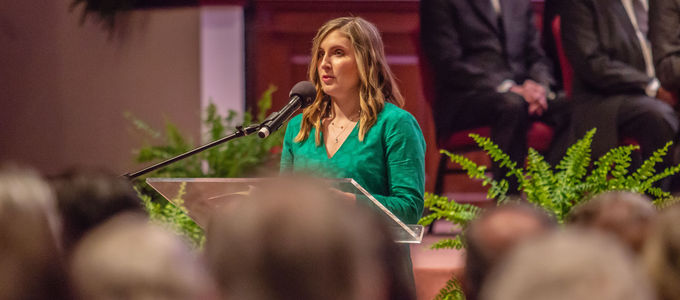More Bible readings and meditation in divine service

Reading the Bible is essential for Christians. In future, people who attend New Apostolic services will experience even more of this. At the recent session of the District Apostle Meeting International, the District Apostles adopted three changes.
The liturgy creates solemnity, structure, and security
“In the divine service the congregation gathers to hear God’s word and receive blessing through the sacrament. Human beings worship God in reverence and humbleness. Thus divine service is an encounter between God and man” (CNAC 12.1.1). The liturgy prescribes the form and order of divine service. It gives the divine service a set structure and defines where the Trinitarian opening, prayers, the sermon, the absolution, sacramental acts, and the benediction have their place and that they are carried out in a uniform and worthy manner.
Bible reading: explanatory and inspiring
Besides the sermon and the singing that takes place, Bible readings are another audible element during divine service. In the divine services of the New Apostolic Church Bible readings take place on special holy days in the course of the church year. These readings are intended to create a better understanding of the Church holidays and take place on Christmas, Easter, and Pentecost for example.
The last revision of our New Apostolic liturgy occurred at the beginning of the 2010 church year. New elements of silence, a more elaborate celebration of Holy Communion, a Bible reading on special divine services, and a hymn of repentance sung by the entire congregation have been making the divine services since then more solemn, while involving the congregation more in the worship process.
Additional Bible readings, more meditation
At their meeting this past week in Zurich (Switzerland), the Chief Apostle and the District Apostles passed three resolutions that broaden the liturgical processes and organise them in a more flexible way.
1. In youth services, young people may read from the Bible or the Catechism of the New Apostolic Church. Suitable passages will be specified by the respective District Apostles. Beyond this, young people may say a prayer before or after the youth service to mark a special occasion or relate an experience they may have had. This must be arranged with the parties involved beforehand. – By offering additional Bible readings, the District Apostles want to make the context of the Bible text clearer and open up the listeners’ perspective by helping them to better understand the explanations in the sermon.
2. In the Bible study services, which generally take place once a month, suitable Scripture passages can now be read out loud. The Divine Service Guide Working Group will recommend suitable Bible passages for these services. – Through these additional Bible readings, the Church leaders wish to involve the participants more in the divine services. And seeing that the divine service is captioned “Bible study”, it should also reflect biblical context.
3. In all divine services, the officiant may invite the congregation to observe a minute’s silence in preparation for the forgiveness of sins and Holy Communion instead of a hymn of repentance. The congregation remains seated for this. In a comment, the District Apostle Meeting stated: this is definitely not to be done in every divine service. However, if a minute’s silence is used sensibly, it can strengthen the congregation’s awareness of the absolution and the celebration of Holy Communion.
Liturgy – for the congregation, with the congregation
Asked about liturgy, the Latin American theologian Casiano Floristán said the following a few years ago: “The celebration of the Eucharist is not a spectacle one attends, but an act in which the assembly participates.”
The liturgy is therefore not only the order in a divine service, but also the solemnity in which the congregation participates directly—sometimes more, sometimes less actively. Participation, specifically, is the nature of the communal celebration of Holy Communion, but it also becomes perceptible in the hymns we sing together, in prayers we say in public, and in Bible readings. The solemnity is intensified in these additional moments of contemplation. It is a space and time dedicated to man’s encounter with God.
Photo: Alex Ferguson




